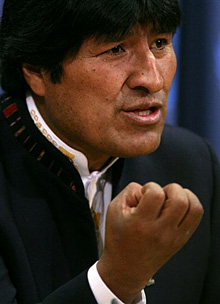
|  |  |  Americas & Beyond | November 2008 Americas & Beyond | November 2008  
Bolivian President Says He Won't Let DEA Come Back
 Edith M. Lederer - Associated Press Edith M. Lederer - Associated Press
go to original


| | Bolivia President Evo Morales speak during a news conference following his address to the United Nations General Assembly at U.N. headquarters, Monday, Nov. 17, 2008. (AP/Bebeto Matthews) | | |
United Nations — Bolivian President Evo Morales expressed hope Monday for improved relations with the United States under Barack Obama's presidency, but said he will never allow the U.S. anti-drug agency to resume operating in his country.

The socialist leader, a close ally of Venezuelan President Hugo Chavez, accused the Drug Enforcement Administration of "political aggression" in Bolivia, which is a major source of coca plants, the raw ingredient for cocaine.

Morales said his government would set up a new intelligence operation involving the military and police to fight drug trafficking in place of the DEA, whose Bolivian operations he suspended Nov. 1.

Morales, the former leader of a coca growers union, also said Bolivia will seek to remove coca leaf from the U.N. list of prohibited drugs. While coca can be turned into cocaine, Bolivians use the small green leaf in its less-potent natural form as a traditional tea or for chewing.

Bolivia-U.S. relations have deteriorated in recent months as Morales' government halted DEA activities and expelled U.S. Ambassador Philip Goldberg, accusing him of spying and involvement in anti-government protests in the eastern lowlands.

The U.S. government has denied helping Morales' opponents, and warns that ending the DEA operation will result in even more cocaine being produced in Bolivia and shipped to other countries. The State Department did not have any comment on Morales' latest statement.

Repeating his allegations, Morales announced the ban on DEA operations when asked at a news conference whether he would agree to a return of the DEA after Obama takes office.

"The DEA will not return while I am still president," Morales said. "The DEA ... had an intelligence structure, but it wasn't so much to fight drugs, it had more to do with the political aggression against my government. ... In recent times, we've seen some officials of the DEA involved in political conspiracy."

Noting that he was the first native Indian president of Bolivia, and that Obama is the first black president of the United States, Morales said, "I feel that the world has started to change."

"My great desire is to improve diplomatic relations, trade relations, cooperation" with the United States, he said.

Morales held the news conference after speaking during a General Assembly debate on U.N. reforms and achieving U.N. anti-poverty goals. He was the only head of state to address the session. All other speakers were ambassadors or lower-ranking diplomats.

He told the assembly he wanted to speak out for "deep-reaching economic and social change," saying his government is striving to improve the lives of all Bolivians. |

 |
|  |



